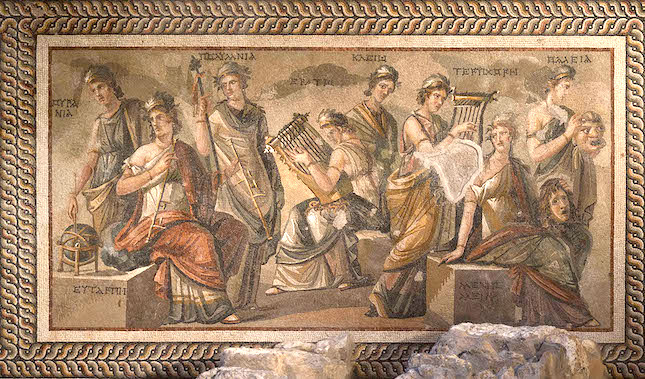Listen to Your Muse: Transform Inspiration Into Working Strategy

Capture Your Inspirations
Seasoned writers know that a sudden flash of inspiration can be fleeting. Creating a system to capture those ideas helps you expand and refine your novel.
Inspiration is often personified as a muse, coming unbidden to give you a new idea.
In Greek mythology, there were nine muses. According to Infoplease,
The Nine Muses were Greek goddesses who ruled over the arts and sciences and offered inspiration in those subjects. They were the daughters of Zeus, lord of all gods, and Mnemosyne, who represented memory. Memory was important for the Muses because in ancient times, when there were no books, poets had to carry their work in their memories.
Calliope was the muse of epic poetry.
Clio was the muse of history.
Erato was the muse of love poetry.
Euterpe was the muse of music.
Melpomene was the muse of tragedy.
Polyhymnia was the muse of sacred poetry.
Terpsichore was the muse of dance.
Thalia was the muse of comedy.
Urania was the muse of astronomy.
Following the concept of the muses, any one of the muses will inspire a detail of your story.
How the Muses Inspire Your Story
Inspiration sparks every detail in your story, adding conflict and specifics that ground the reader and connects them with your characters.
In the middle of the night, you have an idea for the twist that turns everything around at the midpoint (Calliope). You may search for the right wound for your protagonist and suddenly have an idea for a backstory that fits your character’s personality (Clio). A character will come to mind as a love interest for your protagonist (Erato). You may use a sentence as a placeholder until you find the phrasing the flows with grace (Euterpe).
Although a traditional mystery is a Comedy, you may find tragic moments to build empathy (Melpomene). Your secondary theme, after finding the truth, can influence the entire tone of your story (Polyhymnia). You may move around in your bedroom to choreograph the movements of a fight scene (Terpsichore).
Creating a climax that reveals the villain and fulfills the story engagingly is the gift of Thalia, the muse of Comedy. Your ideas for where the story takes place in the world add a sense of reality (Urania).
Create An Inspiration Collection System
When ideas arrive, you need a collection system to put them to use in your story. Without a system, you can end up with ideas that disappear even when they feel inspirational at the time.
The system is the important ingredient. What you use for your system depends on your personal preference.
Traditional Cards
Traditional 3 x 5″ cards are perfect for notes. You can tuck them in a pocket, keep a stack by your bed, or on your desk. Jot down your idea wherever you are. Then, when you are at your desk, you can add your idea to your story.
Voice Notes
Writers use voice notes on their mobile device to capture an idea when the muse strikes. Your mobile device is usually where you are—bed, kitchen, in a vehicle, on a walk. You don’t need a pen or pencil to capture your idea.
Notebook
Many writers have one or several notebooks for capturing ideas—one by the bed, one in a backpack or handbag, one at the desk, etc. Because a notebook is bound, there is less chance of losing a loose piece of paper, like a 3 x 5 card.
Whatever system you choose, the key is to use the system.
How To Capture The Idea So It Makes Sense Later
Your muse can appear at unusual times like gardening, or walking the dog, or washing dishes. The most famous and difficult to capture is the one that arrives in the middle of the night.
The idea comes full-blown with how it fits into your story, how it enriches your character, and where it takes place. Unfortunately, unless you capture the basic thrust of the idea, it may have disappeared by the morning. That’s why you want your system.
But making a quick one-word note that makes perfect sense in the middle of the night may be meaningless in the light of day.
One word like “path” or “glove” can make sense in the middle of the night as capturing the essence of your idea. But not the next day.
Train yourself to wake up enough to write down the important elements of the idea. Instead of “path,” include more. Jim follows the path in woods to the hidden cabin. Jesse hides bodies there.
Practice extending your inspiration notes so the meaning will be clear later. Your story will be rich with detail.
